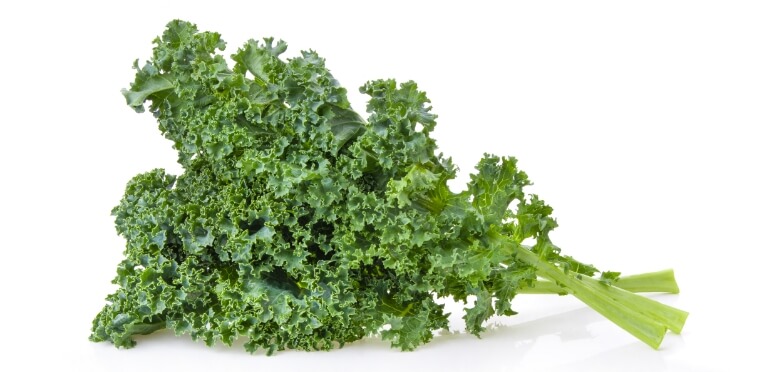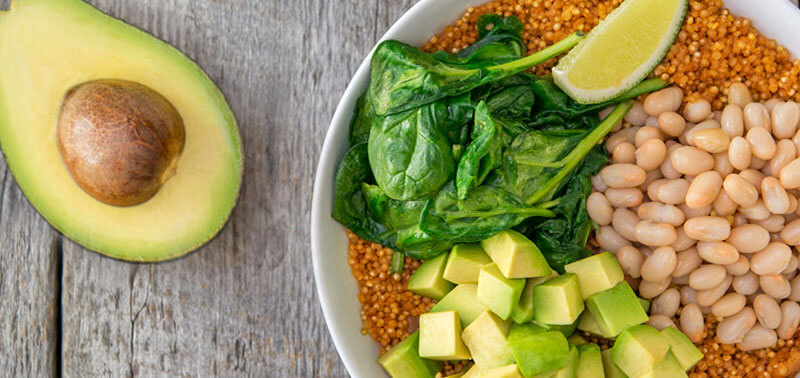Lutein and Cognitive Health
Nutrients in a Lutein is a carotenoid found in foods like kale, spinach, corn, peas, and avocados. A 50 g serving of avocado contains 136 mcg of lutein and zeaxanthin. Lutein acts as an antioxidant, concentrating in the eyes and areas of the brain, and may help support memory, executive function, and overall brain health.
Potential Benefits
Nutrients in a Some studies link higher lutein levels to better memory and mental skills like planning and focus. Because lutein can cross the blood–brain barrier, it may help protect brain cells from oxidative stress and support healthy cell membranes. Including foods that contain lutein in a balanced diet may help maintain cognitive performance with age, though results vary and more research is needed.
Getting Lutein from Foods
Lutein is fat-soluble, so the body absorbs it better with healthy fats. Sources include raw kale (22,148 mcg per cup), cooked spinach (7,536 mcg per ½ cup), broccoli, corn, peas, and avocados, with leafy greens providing especially large amounts of lutein: raw kale provides 22,148 mcg per cup, and cooked spinach provides 7,536 mcg per ½ cup. A varied diet rich in produce is the best way to meet daily needs without relying solely on supplements.
Our cognitive well-being is a growing concern among many Americans, especially for those who are at high risk of developing forms of dementia, such as Alzheimer’s. According to 2025 estimates from the Alzheimer’s Association, 7.2 million Americans who are 65 or older live with Alzheimer’s. While there is still no cure for Alzheimer’s, many people aim to reduce their risk by prioritizing their cognitive well-being. Cognitive well-being includes more than just preventing cognitive decline, though. It aims to improve your focus, memory, and thought processing speed at any age.
While you can’t fix your cognitive well-being overnight, consistently eating a balanced diet can play a significant role in boosting your overall health, including your brain health. Let’s learn more about this powerful nutrient, how it may support your cognition, and how to incorporate it into your diet with the help of delicious foods like avocados.
What Is Lutein?
Lutein is a pigment, or carotenoid, that you can naturally find in many fruits and vegetables. This vitamin gives these foods their vibrant yellow, orange, and green colors. This pigment protects plants from damage caused by excessive light. We can also find lutein in the human body, helping protect sensitive organs — such as the brain and eyes — from unstable molecules called free radicals that can cause oxidative stress and inflammation. In particular, high levels of lutein have been linked to higher levels of macular density in the eyes, which can help prevent macular degeneration. In addition, it has been associated with positive effects on the brain, supporting healthy cell membranes and reducing inflammation.
Lutein is also fat-soluble, meaning the body absorbs it more effectively when consumed with healthy dietary fats. If you pair lutein with sources of healthy fat such as avocado, olive oil, or nuts, your body will absorb the vitamin better, ensuring you get the most benefit from this nutrient.
Cognitive Benefits of Lutein
Because of lutein’s antioxidant and protective properties, many researchers have associated it with several cognitive benefits, including:
Improved Memory
Lutein absorption occurs at every life stage, even in utero. This absorption can play a role in positive cognitive effects, such as better memory. For young kids, memory assists not only in establishing a sense of self, but it can also help with learning and developing speaking and writing skills. To help stimulate this kind of development, good nutrition should be a priority even before birth. One study of 1,580 mother-child pairs found that the mothers who had higher levels of maternal lutein and zeaxanthin (5 mg/d of L/Z) were more likely to have children with better verbal intelligence and behavior regulation by the time they reached mid-childhood. With a strong foundational memory, kids can develop these skills, setting them up for success the rest of their lives.The results are limited by potential unknown confounding variables, do not infer causation, and cannot be generalized to all populations.
However, lutein may be influential to memory even well into adulthood. One 2019 study found that in a group of overweight to obese adults aged 25-45 years, those with higher lutein levels were more likely to perform better on spatial reconstruction memory tasks than those with lower lutein levels. While more studies are needed to explore the connection between lutein and memory fully, researchers do believe it may play a significant role in the functions of parts of the brain, including the hippocampus, which is responsible for memory.
Better Executive Function and Processing Speeds
Executive function — the set of mental skills that includes planning, focus, and problem-solving — plays a significant role in how efficiently we handle daily tasks. We use it in our schooling, in our work, and even when simply completing chores. Similarly, the processing speed at which we think enables us to absorb information quickly, make decisions, and socialize with others.
As we age, these two functions naturally decline, so it’s crucial to find ways to prevent or at least slow down this change, including adjusting your diet. One study conducted on 4,076 adults aged 50 years and older found a positive association between executive function and people who had high levels of lutein in their blood plasma. While there was no association found between lutein and processing speeds, researchers in the study did find a positive association with zeaxanthin, a co-occurring carotenoid often found with lutein. While we need more conclusive research, these findings point to lutein as a valuable nutrient for preserving mental agility and cognitive well-being over time.
Prevent Cognitive Decline
It’s a fact of life: as we get older, our risk of developing cognitive disorders like dementia rises. While nothing can reverse dementia, lutein may be powerful for our minds as we age. For instance, one systematic review of peer-reviewed studies found that even 10 mg of lutein over a year was positively associated with higher neural activity in the brains of older adults when completing cognitive tasks. While it’s not a stand-alone solution for preventing age-related cognitive conditions, maintaining a diet with lutein-containing foods may be a valuable step in supporting lifelong cognitive well-being.
Potential Neuroprotection
Beyond supporting day-to-day mental performance, lutein may offer longer-term neuroprotective benefits. Because it readily crosses the blood-brain barrier, lutein can accumulate in brain regions critical for memory, learning, and emotional regulation. Once there, lutein and zeaxanthin may provide neuroprotection due to their antioxidant and anti-inflammatory properties. This may contribute to healthy nerve signal transmission. While we need more studies to confirm its full neuroprotective potential, the current research reinforces the value of regularly including foods with lutein in a balanced diet as part of a long-term brain health strategy.
Important Considerations About Lutein
While many researchers have been exploring the connection between lutein and cognition, we still need more research to prove anything conclusively. For one, there are plenty of lifestyle and individual variables to consider that may affect cognition, such as the amount of time you spend exercising, your family and medical history, what you do as a career, and how much sleep you get at night.
That said, prioritizing a balanced diet, which includes eating foods that include nutrients like lutein, has been directly linked to a positive cognitive well-being.

Dietary Sources of Lutein
While you can always take lutein as a supplement, you can also find lutein in plenty of foods, such as:

Cooked spinach:
Contains 7,536 mcg of lutein and zeaxanthin per .5 cup.

Raw kale:
Contains 22,148 mcg of lutein and zeaxanthin per one cup serving size.

Cooked broccoli:
Contains 1,736 mcg of lutein and zeaxanthin per .5 cup.

Boiled corn:
Contains 1,476 mcg of lutein and zeaxanthin per .5 cup.

Peas:
Contains 1,147 mcg of lutein and zeaxanthin per .5 cup.
By regularly enjoying a mix of these foods, you can help ensure your body has a steady supply of lutein to support both eye health and cognitive well-being.
Avocados: A Delicious Way to Incorporate Lutein Into Your Diet
In addition to the foods listed above, avocados also include lutein — 136 mcg per 50 g serving. Researchers have found that this amount is enough to make a measurable difference in lutein levels in the body. For instance, in an Avocado Nutrition Center-funded clinical study of 40 healthy, older adults, researchers found that people who consumed at least one avocado per day for six months had higher blood and eye lutein levels compared to when they started the study. The avocado group also had improvements in cognition as measured by improvement in working memory. Although we cannot generalize the conclusions drawn from a single study to all populations, the research suggests a dietary intervention with avocados to increase neural lutein may be a useful dietary strategy for cognitive health.
How To Incorporate Lutein and Avocados Into Your Diet
Getting enough lutein doesn’t have to mean overhauling your entire eating routine — it’s more about adding nutrient-rich foods into meals you already enjoy.
Prepping Meals with Lutein
Freshness and preparation methods can make a big difference in the lutein content of your meals. Leafy greens like kale, spinach, and collard greens retain much of their lutein when lightly steamed or sautéed rather than boiled for long periods.
To make eating more lutein easy, try prepping washed and chopped greens ahead of time so they’re ready for salads, smoothies, or quick sautés. Avocados are best added just before serving to maintain their texture and nutrient profile, whether you’re tossing them into a salad, layering them on a sandwich, or blending them into a smoothie. If you do prep the avocado beforehand, you can squeeze lemon juice on top of the avocado and cover it with cling film or plastic wrap and store it for up to three days afterwards.
Eating Foods High in Healthy Fats
Because lutein is a fat-soluble vitamin, the body absorbs it more efficiently when paired with dietary fat. That’s where avocados shine — their 5 g monounsaturated fats can help boost lutein absorption from other vegetables on your plate. Pairing cooked spinach with a drizzle of olive oil, topping a corn and pea salad with sliced avocado, or adding nuts and seeds to a kale dish are all simple ways to ensure your body gets the most from these foods.
Our brain is arguably the most influential organ in the body, and just like every other organ in our body, taking care of it is one of the best ways to better your life now and in the future. By incorporating lutein as part of a balanced diet, you can help nourish your body and your mind.
If you need inspiration for meals that feature both avocados and lutein, check out Love One Today’s recipes. Our creative and helpful tips will make eating avocados easy and fun!




